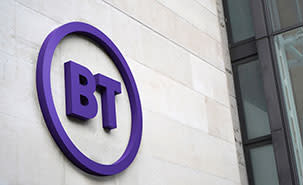BT reported a 2% drop in first-quarter underlying revenue to £5.1bn. The Business segment was the biggest detractor, impacted by the phasing out of old contracts and reduced sale activity in low-margin areas. Openreach was the only business segment to grow revenue, driven by higher prices and the ongoing fibre buildout.
Profit before tax was down 3% to £520mn. That was driven by lower revenue, offset somewhat by lower operating costs.
Full-year guidance is unchanged. That points to adjusted revenue growth of 0-1%, cash profit of around £8.2bn, and underlying free cash flow of approximately £1.5bn.
The shares fell 3.5% in early trading.
Our view
BT’s made a decent start to the new year, though nothing to shoot the lights out.
Cost cuts remain in focus, with £3bn of annual savings expected to be delivered over the next few years. There’s also been recent chatter that the cost of building fibre and 5G infrastructure may have peaked. That’s good news for future cash flow, and the valuation which it’s weighed on for some time. Once the infrastructure is built and adopted, a much leaner operation is needed to generate long-term growth.
The wider strategy involves significantly modernising and simplifying operations and product lines. This includes switching all mobile products under the EE brand and moving customers onto the new 5G and fibre broadband networks, which have lower running costs than legacy infrastructure.
The asset we’re most excited by is Openreach, which is responsible for maintaining and building out the new fibre networks. It hopes to reach 25mn premises by 2026 and looks well on track to do that. This technical-heavy business is unique and higher margin.
The Business division continues to be the problem child - so much so that BT had to write down the value of the asset to the tune of nearly £500mn last year. A combination of structural changes, higher costs, and a tough competitive landscape are making it a tricky place to operate. It’s still throwing off free cash last we heard, but at margins that are good clip lower than those of the Consumer and Openreach units.
Another drain on cash is BT's large pension deficit. The current payment plan cost just over £800mn in the year just ended. Add to that the debt and lease pile, which cost a combined £1.6bn to service over the half, and the drags on cash are hefty.
BT’s future relies heavily on getting past the peak buildout phase, and to its credit, progress looks good. We think BT is one of the better-placed names, especially with a great asset like Openreach on the books. The question yet to be answered is whether all that spending is going to generate enough top-line growth to materially offset the decline of legacy products, a challenge for the entire sector to battle with.
Environmental, social and governance (ESG) risk
The telecom industry is low/medium in terms of ESG risk. Data privacy and security is the most significant risk driver, not only because customers are increasingly concerned about privacy, but also because cybersecurity breaches can be costly. Product quality is another key risk, particularly given the networks they manage are considered critical infrastructure. Carbon emissions, human capital and business ethics are also risks worth monitoring.
According to Sustainalytics, BT’s overall management of material ESG issues is strong
BT follows strict security measures to protect personal data and has 3,000 cybersecurity employees. Greenhouse gas reduction policies are strong, including net zero alignment, emissions reduction coverage, audits and verification. BT scores well on board structure, shareholder rights, remuneration, audit and financial systems, and stakeholder governance.
BT key facts
All ratios are sourced from Refinitiv, based on previous day’s closing values. Please remember yields are variable and not a reliable indicator of future income. Keep in mind key figures shouldn’t be looked at on their own – it’s important to understand the big picture.
This article is not advice or a recommendation to buy, sell or hold any investment.No view is given on the present or future value or price of any investment, and investors should form their own view on any proposed investment.This article has not been prepared in accordance with legal requirements designed to promote the independence of investment research and is considered a marketing communication.Non - independent research is not subject to FCA rules prohibiting dealing ahead of research, however HL has put controls in place(including dealing restrictions, physical and information barriers) to manage potential conflicts of interest presented by such dealing.Please see our full non - independent research disclosure for more information.


